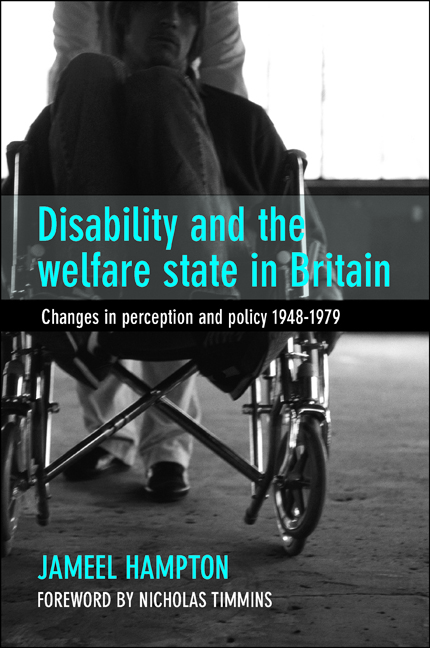Book contents
- Frontmatter
- Contents
- List of tables
- List of acronyms
- About the author
- Acknowledgements
- one Introduction
- two The old regime: provision for disabled people before the welfare state
- three Promotional welfare, 1948–63
- four The emergence of disabled people, 1964–69
- five Cinderella of the welfare state: legislation for disabled people, 1970–72
- six The final days: disability at the end of the welfare state, 1973–79
- seven The last waltz: epilogue
- eight Conclusions
- Appendix: Ministerial periods of office
- Bibliography
- Index
five - Cinderella of the welfare state: legislation for disabled people, 1970–72
Published online by Cambridge University Press: 01 September 2022
- Frontmatter
- Contents
- List of tables
- List of acronyms
- About the author
- Acknowledgements
- one Introduction
- two The old regime: provision for disabled people before the welfare state
- three Promotional welfare, 1948–63
- four The emergence of disabled people, 1964–69
- five Cinderella of the welfare state: legislation for disabled people, 1970–72
- six The final days: disability at the end of the welfare state, 1973–79
- seven The last waltz: epilogue
- eight Conclusions
- Appendix: Ministerial periods of office
- Bibliography
- Index
Summary
Timeline, 1970–72
1970
May The Chronically Sick and Disabled Persons Act is passed.
June Election: Conservatives (330), Labour (288), Liberals (6), Others (7).
July Iain Macleod dies. Secretary of State for Social Services Keith Joseph announces that the Constant Attendance Allowance is available to 60,000 families.
1971 Unemployment rises from 700,000 in February to near 1 million in December.
March Barber's first full budget announces a £560 million increase in funding for pensions and benefits.
DIG releases report revealing the abject state of British disability provision in comparison to other European countries.
May First part of OPCS’ study of disabled people is released.
September Invalidity Benefit, available to those with adequate National Insurance contributions, is announced.
December Constant Attendance Allowance becomes available.
1972
January Unemployment exceeds 1 million.
March ‘Dash for Growth’ budget is introduced: public spending continues to increase.
Announcement that the Constant Attendance Allowance is to be broadened to include those needing care day or night.
April Extended Constant Attendance Allowance and Invalidity Benefit become available.
June DHSS completes its European report.
DIG publishes Strategy for a national disability income.
September Media coverage of compensation for thalidomide victims begins. Cabinet begins to consider intervention.
December Mary Greaves retires from DIG because of illness. Peter Large becomes honorary spokesman.
Introduction
With major reorganisation of the social services decided, and the situation of more esteemed ‘gap groups’ examined in the 1960s, the welfare state would now address the poorest sister of solidarity.
This period began with the highly publicised passage through Parliament of the CSDP 1970. As the first legislation for all disabled people, it served to raise interest in disability to an unprecedented level. The first assessments of the Act were released in 1973, and so, in this period, the Heath government was largely free from criticisms about its implementation. The period closed with the temporal coincidence of important events in the final months of 1972: a new government study group on future cash benefits for disabled people was founded; Peter Large became DIG's honorary spokesman; and the Heath government came under intense public scrutiny about compensation for thalidomide victims.
The postwar economic situation had been relatively favourable to increasing social welfare expenditure, but there were warning signs that this was in jeopardy. Inflation and unemployment began to rise in the late 1960s. There was also the trend of low industrial productivity and slow growth since the mid-1950s.
- Type
- Chapter
- Information
- Disability and the Welfare State in BritainChanges in Perception and Policy 1948-79, pp. 133 - 180Publisher: Bristol University PressPrint publication year: 2016



